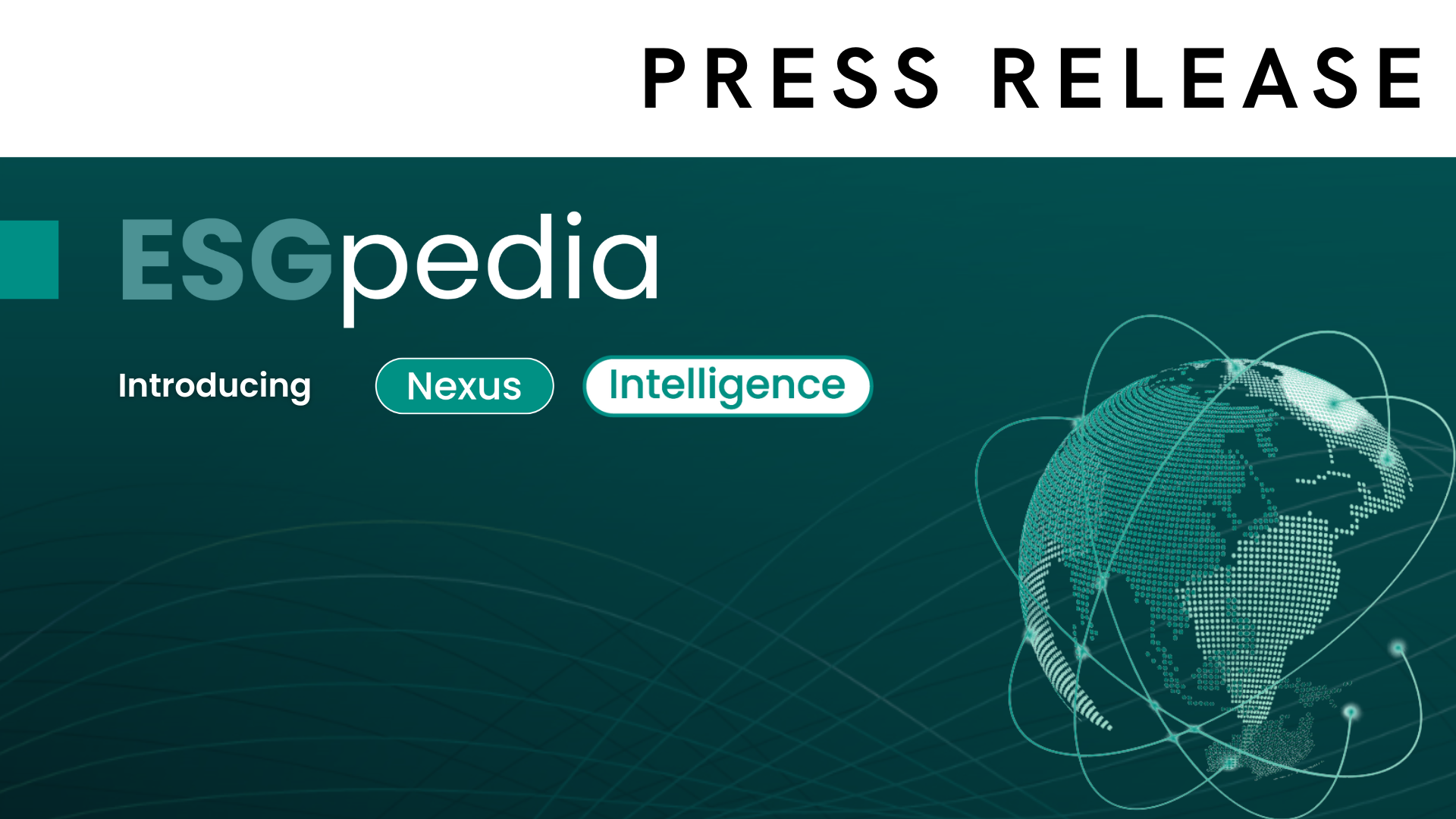SINGAPORE, 2 November 2023 –
Asia’s leading Environmental, Social, and Governance (ESG) data and technology solutions company, STACS, has launched upgrades to its ESGpedia platform, offering digital tools to help businesses and financial institutions comply with the increasing ESG regulatory requirements across Europe and Asia. With that, ESGpedia also unveiled several key use cases with banks and corporates across the ASEAN region.
Starting from 2024, more than 50,000 European Union (EU) companies and 10,000 non-EU companies will be directly in scope under the European Sustainability Reporting Standards (ESRS), and this coverage includes their value chains, of which 90% is represented by SMEs largely in Asia. Various Asia markets have also implemented mandatory regulatory reporting to enhance the adoption of global sustainability and ESG standards such as the International Financial Reporting Standards’ (IFRS) inaugural ISSB standard, with many disclosure requirements extending to large non-listed companies and SMEs.
While financial institutions and large corporates need access to ESG data of SMEs in their supply chains, they face a lack of data, especially in the Asia Pacific region.
To help to plug the ESG data gaps in Asia Pacific and provide a complete ESG database, ESGpedia has enhanced its Artificial Intelligence (AI)-powered engine to provide a dual approach – Nexus and Intelligence.
ESGpedia Nexus enables companies of various ESG maturities to achieve their end-to-end business needs and full readiness through active engagement and its marketplace of sustainability solutions. To lower barriers to sustainability, companies can create their free ESG profile with simplified ESG metrics scalable to support international assessments and standards reporting. It offers digital tools that automatically convert operational data like fuel, refrigerant, and electricity consumption to greenhouse gas (GHG) emissions under the standard GHG Protocol, localised to all Asia Pacific countries. To help companies take positive actions towards ESG excellence, ESGpedia Nexus provides a marketplace where companies can amplify their ESG profile, and sell or procure ESG services.
ESGpedia Intelligence empowers banks, investors, insurers, and corporates to overcome data fragmentation and provide a complete picture with aggregated ESG data across countries and sectors via AI-powered harmonisation of unstructured ESG data. Since the launch of ESGpedia version 2.0 in May earlier this year with 5 million sustainability data points, the platform has since strengthened its AI-capabilities in aggregating, harmonising, and standardising ESG data (to even smart extraction of ESG metrices from documents) and enhanced its data coverage – it now includes 300,000+ companies’ sustainability data, of which 115,000+ company profiles have full corporate data overlaid and standardized. As a key development, the platform now offers Taxonomy Regulatory Mapping which provides digital automation to transform portfolio data to regulatory needs like ESRS, Environmental Risk Questionnaire (ERQ) in Singapore, Climate Change and Principle-based Taxonomy (CCPT) Due Diligence in Malaysia, Philippines SEC Sustainability Reporting Form (SuRe), and more.
In May 2023, ESGpedia launched the ESCAP Sustainable Business Network (ESBN) Asia-Pacific Green Deal for Businesses digital program on ESGpedia, in partnership with ESBN. This provides a digitalised and simplified self-assessment tool meant to lower the barriers to entry for corporates and SMEs, in order to help them kickstart their sustainability journey. This will help companies report metrics that are aligned with stakeholders’ needs and provide them an automated calculation of their GHG emissions, localised to multiple countries in Asia Pacific. Companies which pledge their support and complete the digital assessment will be awarded an ESBN Green Deal badge in Gold, Silver, or Green to recognise their commitment to sustainability.
Since then, ESGpedia has supported more than 100 companies across Asia-Pacific to achieve their ESBN Green Deal badge. The platform has also rapidly expanded across Asia, launching in several ASEAN markets including Vietnam, the Philippines, and most recently, Indonesia, to support countries’ local ecosystems, financial sector, and businesses in their ESG journey. The latest key use cases include:
Streamlining the extension and monitoring of Sustainability Linked Loans – use case by OCBC and Ghim Li
Through data digitally collected on ESGpedia via the ESBN Asia-Pacific Green Deal digital assessment and independently verified by Bureau Veritas (an ESGpedia marketplace partner), OCBC successfully extended a Sustainability Linked Loan (SLL) to a global textile and apparel manufacturer, Ghim Li.
Using the operational data input by Ghim Li, the calculation of emissions and verification of the data were automated on ESGpedia. Data for the agreed Sustainability Performance Targets of the SLL were then recorded in the platform for monitoring purposes. For having completed the ESBN Asia-Pacific Green Deal digital assessment, Ghim Li was awarded an ESBN Green Deal badge in Silver.
Banks will be able to extend SLLs to businesses more efficiently with this simplified process, and more businesses will find it easier to determine their emissions and kickstart their sustainability journey.
Localization to support different financial institutions and countries’ ecosystem of SMEs – use cases with Bamboo Capital Group, Funding Societies, and the PDS Group
ESGpedia has officially launched in Vietnam, Indonesia, and the Philippines, in partnership with Bamboo Capital Group, Funding Societies (operating as Modalku in Indonesia), and the Philippine financial market infrastructure, PDS Group, respectively. As part of the ASEAN Single AccessPoint for ESG Data (SAFE) pilot initiative led by the Sustainable Finance Institute Asia (SFIA), the cross-border partnerships in the various ASEAN markets aim to support Asia supply chains and SMEs towards ESG reporting and sustainable financing solutions, so as to enable them to be better positioned to manage rising regulatory requirements in the region and leverage ESG opportunities.
Through the partnership, Bamboo Capital Group, Funding Societies, and PDS Group will be promoting ESGpedia and the ESBN Asia-Pacific Green Deal digital assessment for use by its community, to facilitate their ESG data reporting journey expected to become a set of regular corporate disclosures.
Enhancing carbon mitigation with Renewable Energy Certificates (RECs) and carbon credits – use case with Bamboo Capital Group
ESGpedia offers RECs and carbon credits through its marketplace, to companies wishing to offset their Scope 2 carbon emissions from electricity usage. Bamboo Capital will be utilising ESGpedia to promote greater transparency of the RECs lifecycle and to ensure no double-trading. The partnership aims to allow market participants to comprehensively access all attributes and data of RECs via a common registry to facilitate transparency, tracking, and investment decisions.
Integration with global technology systems to streamline ESG disclosure for their ecosystem – use case with Info-Tech
ESGpedia allows for integration with technology systems like Info-Tech, a global HR management system, to streamline ESG reporting for their ecosystem of companies by allowing for autofill reporting via automapping of data points to frameworks, document data extraction, and API integration. Info-Tech Time Attendance software and Leave Management software enables for the automatic calculation and tracking of some common Social metrics. Relevant data points in the ESBN Asia-Pacific Green Deal digital assessment can be pre-filled automatically, accelerating the disclosure process.
Driving sector-specific implementations towards sustainability – use case with CO2 Connect (CO2X)
ESGpedia helps support sectors towards decarbonisation. Carbon emissions tracking platform CO2 Connect (CO2X) has partnered with STACS to promote ESGpedia to its ecosystem of transportation and logistics businesses to simplify their ESG reporting process through the ESBN Asia-Pacific Green Deal digital assessment. Fleet operators can now have their operational data captured by CO2X and converted to carbon emissions metrices, whereby these data points are integrated into ESGpedia for direct plugging into the ESBN Green Deal program, allowing them to earn their ESBN Green Deal badges seamlessly.
Accelerating digital business growth in a green economy – use case with Proxtera
ESGpedia offers education to digitally enable ecosystems and businesses towards sustainable development. ESGpedia powers a module in Proxtera’s SME Financial Empowerment Green Financing (Intermediate) programme. Proxtera is the operationalisation of the Business Sans Border (BSB), an initiative by the Monetary Authority of Singapore (MAS) and Infocomm Media Development Authority (IMDA), building an open, global ecosystem of MSMEs using trusted credentials to access trade and financing opportunities. The programme, which will officially launch at the Singapore FinTech Festival 2023, will empower SMEs to learn and immediately take the first step towards sustainability reporting, through a free Starter Tool on the ESGpedia platform.
Benjamin Soh, Founder and Managing Director at STACS, said: “ASEAN companies are facing increasing mandatory ESG requirements, which are extending to large non-listed companies and SMEs. This is where understanding your current ESG profile and leveraging technologies like Artificial Intelligence come in place to help companies ensure compliance towards the evolving ESG regulations landscape across Europe and Asia. We are thrilled that ESGpedia’s latest platform updates – with the introduction of ESGpedia Nexus and Intelligence – has helped financial institutions and companies across ASEAN achieve their ESG goals regardless of their ESG maturities, and fill the ESG data gaps in Asia Pacific today.”
The latest ESGpedia’s solutions were showcased at STACS’s industry event on 2 November 2023, with the attendance of associations, financial institutions, and corporate leaders. Dr Tientip Subhanji, Chief of Sustainable Business Network at United Nations Economic and Social Commission for Asia and the Pacific (ESCAP), who delivered the opening address at the industry event as a prelude to this year’s Singapore FinTech Festival, said that in order to make sustainability sustainable, all stakeholders, including governments, businesses, and societies in the region, need to work together.
“The private sector, especially small and medium-sized enterprises (SMEs), is expected to play a critical role by leading the region’s green transformation. The purpose of the ESBN Asia-Pacific Green Deal digital program on ESGpedia is to encourage companies in the region, especially SMEs, to start their sustainability journey through providing a digital self-directed platform for them to assess their ESG efforts. With almost 200 signups [since May 2023], I believe that the initiative is going from strength to strength.”
The latest features and partnerships of ESGpedia underline the STACS’s commitment to empower Asia towards sustainability with a data and technology approach.
STACS (www.stacs.io)
Grace Lim, Senior Marketing Manager
Email: [email protected]
About STACS
STACS (Hashstacs Pte Ltd) is Asia’s leading ESG data and technology company, headquartered in Singapore. Its ESGpedia platform powers the ESCAP Sustainable Business Network (ESBN) Asia-Pacific Green Deal digital platform and the ASEAN Single Accesspoint for ESG Data (SAFE) pilot initiative, and is a technology partner of the Monetary Authority of Singapore’s (MAS) Project Greenprint. ESGpedia serves as the Nexus of ESG, empowering the financial sector, corporates, and SMEs to attain their ESG goals. For more information, please visit www.stacs.io.
PRESS CONTACTS
If you are a journalist with media queries, contact us.
Related Press Releases: PR Newswire | CIO World Asia | Fintech News Philippines | Manila Bulletin Publishing Corporation





